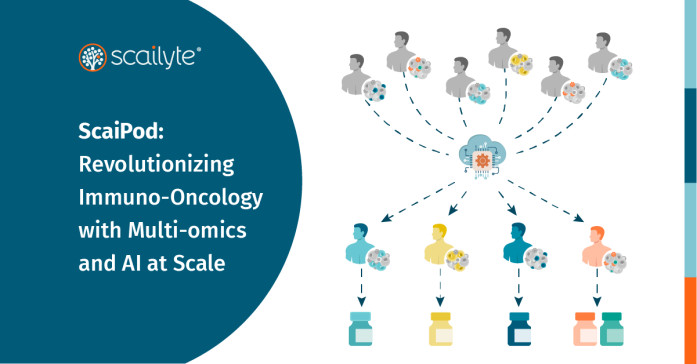
ScaiPod: Revolutionizing Immuno-Oncology With Multi-Omics and AI at Scale
BASEL, SWITZERLAND / ACCESSWIRE / February 26, 2024 / Scailyte is thrilled to announce ScaiPod, a moonshot initiative to solve some of the toughest clinical challenges in immuno-oncology. ScaiPod's mission is to fuel the development of a new generation of clinical biomarkers predictive for the response to immune checkpoint inhibitors (ICI) and thus to enable precision immuno-oncology. Additionally, it will unravel mechanistic insights related to ICI resistance and immune-related adverse effects (irAE), ultimately leading to novel therapeutics in oncology.
 ScaiPod: Revolutionizing Immuno-Oncology with Multi-omics and AI at Scale
ScaiPod: Revolutionizing Immuno-Oncology with Multi-omics and AI at Scale Introducing ScaiPod, the most comprehensive multi-omics initiative aimed at unleashing the full potential of immuno-oncology therapies.
ScaiPod will integrate single-cell multi-omics, imaging, and clinical data to facilitate biomarker assay development and to provide the most comprehensive data lake in immuno-oncology. The resulting biomarker assays will have a major impact both on the R&D side and in the clinical practice. They will enable the identification of the right patient populations in clinical trials and massively de-risk the development of new drugs. Additionally, these precise biomarkers will guide the selection of the right treatment for the right patient, avoiding trial and error practice when giving cancer treatments, and ultimately saving millions of patient lives.
Our unique approach involves establishing a highly automated and standardized workflow for single-cell omics profiling, which fuels our AI-driven platform ScaiVision and yields highly robust biomarkers and clinical assays. As part of the translational work, we will also integrate histopathology imaging data to associate molecular and morphological features.
Prof. Jakob Kather, M.D. - Group Leader of the Clinical Artificial Intelligence research group at the Dresden University of Technology - Scientific Advisor of Scailyte
"Combining imaging data with molecular characterization of patient samples at scale is a multi-modal and powerful approach. A bold initiative such as ScaiPod allows the application of cutting-edge AI technologies to real clinical problems in precision oncology."
In the past decade, advances in single-cell technologies have led to unprecedented biological insights, in particular, mapping the various cell types in health and disease. ScaiPod, however, is set up with a clear focus on associating deep molecular insights with patient outcomes.
Peter Nestorov, Ph.D. - Co-founder and CEO of Scailyte
"ScaiPod goes beyond cell atlasing to establish a highly standardized and scalable workflow for clinical sample processing and data generation. Our goal is to process samples from 5,000 patients across different cancer indications. To do so, we are establishing a precision oncology consortium with like-minded academic and industry partners - all aligned behind the mission to bring the right treatment to the right patient at the right time."
The scale of ScaiPod would not only allow the finding of new predictive biomarkers but also the clinical validation of the ones that are already described. In a seminal paper published in 2018 in Nature Medicine, Prof. Mitch Levesque and his collaborators from the University of Zurich identified a specific immune cell population that is predictive of response to ICI and another one that is prognostic for patient survival.
Prof. Mitch Levesque, Ph.D. - Associate Professor of Translational Dermato-Onology Department, University Hospital of Zurich and University of Zurich
"We identified a subpopulation of circulating monocytes in the PBMC compartment as a predictive biomarker for ICI treatment response. However, a large, multicenter cohort of melanoma patients is still needed to confirm potential biomarker signatures. Therefore, applying a standardized workflow to generate a comprehensive multi-omics dataset in melanoma is critical. In this sense, joining ScaiPod is a unique, exciting opportunity to clinically validate our findings."
The prospective foundational study of ScaiPod will be conducted in collaboration with Prof. Levesque's research group on 250 melanoma patients. In the first phase, PBMCs and tumoral tissue collected before ICI therapy will be analyzed to identify predictive biomarkers. As part of ScaiPod, our partners at the Zurich University of Applied Sciences (ZHAW), under the leadership of Dr. Adisa Trnjanin, Ph.D., will establish an automated and standardized clinical omics workflow. This workflow will be scaled and translated to other cancer centers joining the consortium.
Professor Laura QM Chow, M.D., FRCPC - Affiliate Faculty at the Department of Oncology, University of Texas at Austin - Chief Clinical Advisor at Scailyte
"ScaiPod can generate invaluable insights into cancer biology, helping us to provide personalized treatment to patients. The prospect of establishing a consortium across U.S. and European cancer centers and designing clinical trials aimed at developing companion diagnostics is an exciting and highly rewarding endeavor."
Our team at Scailyte is very excited to present ScaiPod at IO360 in front of key opinion leaders and biotech executives. We are engaging with cancer centers, life science, pharmaceutical, and IT companies to expand and accelerate ScaiPod. Reach out to us if you are aligned with our mission to unleash the full potential of immuno-oncology and save millions of patients.
Contact Information
Peter Nestorov
Founder & CEO
contact@scailyte.com
SOURCE: Scailyte
View the original press release on newswire.com.
Editor Details
-
Company:
- AccessWire
- Website:
